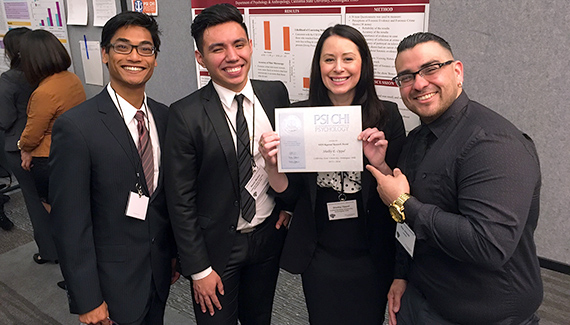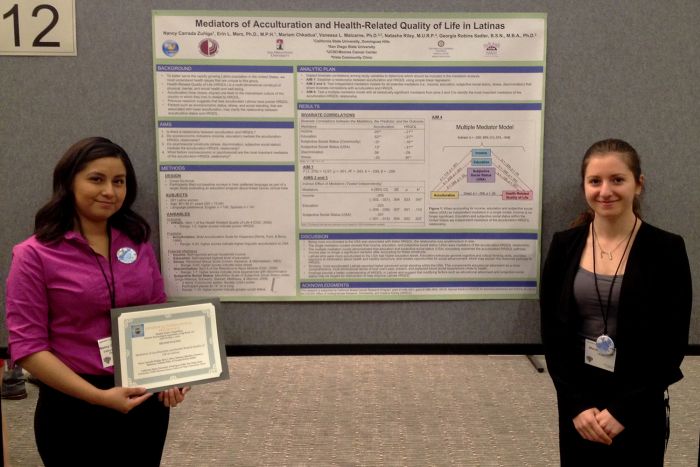
Three California State University, Dominguez Hills (CSUDH) psychology students and their faculty mentors were awarded 1st Place during the International Honors Society in Psychology (Psi Chi) poster session at the Western Psychological Association (WPA) Convention in May 2016.
The winning presentation, “The Bones Effect: Television Influence on Perceptions of Forensic Science,” one of 31 CSUDH student/faculty presentations provided during the convention, was presented by psychology students Shelby Oppel, Ray Jaquez, Kevin Munoz and Daniel A-Haja, and anthropology students Ron Bermudez Perea and Andrea Esparza.
The faculty members on the 1st Place team were Wing Nam (Joyce) Chan, assistant anthropology professor, and Heather Butler, assistant psychology professor, who runs CSUDH’s Applied Psychology and Psychology-Law Lab where the team’s research was conducted. Funding for the research project was made possible by a CSUDH Research, Scholarly and Creative Activity grant that was awarded to Butler and Chan.
“Although the empirical evidence is mixed, there is anecdotal evidence that forensic television shows like CSI are impacting juror decisions in actual cases. The effect is known as the ‘CSI effect,’” said Butler. “Our research found some support for the CSI effect that also extends to findings into the field of forensic anthropology.”

Psychology students Nancy Carrada Zuñiga and Mariam Chkadua, also fared well at the conference, taking 2nd Place in the International Psychology poster session. Titled “Mediators of Acculturation and Health-Related Quality of Life in Latinas,” their research was conducted in CSUDH’s Behavioral Medicine Research Lab, which is run by Erin L. Merz, assistant professor of psychology and faculty adviser of the research group. The team also included students from San Diego State University, Vista Community Clinic, and the University of California, San Diego.
The WPA was founded in 1921 to “stimulate the exchange of scientific and professional ideas and, in so doing to enhance interest in the processes of research and scholarship in the behavioral sciences.”
“Participation in conferences is a wonderful way for students to see cutting-edge research, learn more about their field, add to their academic resumes, attend workshops on how to get into graduate programs, and network with other students and professionals,” said Butler. “Conferences like the WPA’s help them make important decisions about which graduate programs would be a good fit for them. In a few cases, conferences have resulted in internships for our students.”